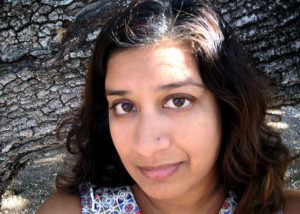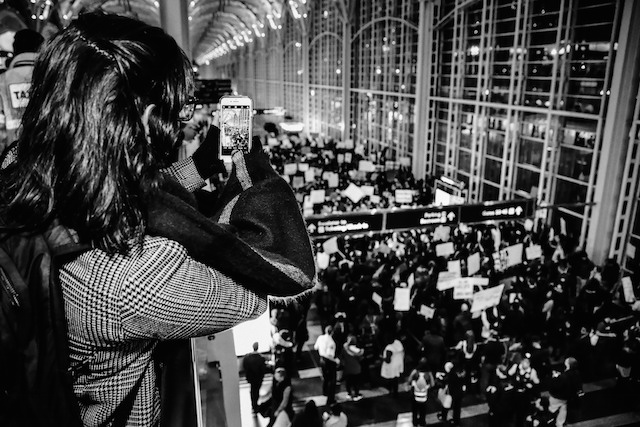An imaginary setting gave me, a child of immigrants, the authority to write about belonging unquestionably to one’s surroundings

November 12, 2015
Join Chaitali Sen and novelist Jennifer Tseng on Thursday, November 19 as they discuss their debut novels at AAWW in a conversation moderated by Gina Apostol.
The cover of my debut novel, The Pathless Sky, features an image of a city I don’t recognize. It looks like it could be somewhere in Southern or Western Asia, but I have no idea how the designer found this picture or whether it is even an actual photograph or some kind of digitally manipulated composite. I suppose it doesn’t matter since my novel is set in an unnamed fictional country, somewhere geographically, politically, culturally, and psychically between the country where I was born—India—and the country where I have lived most of my life, the United States.
The novel follows a couple, John and Mariam, who find their relationship constantly thwarted by their country’s past and current political tensions. The country is a constitutional republic with various provinces largely divided along ethnic lines. It is straining at the borders and constantly at war. It is diverse and rugged and beautiful. It is often on the brink of disaster. In many ways it is not unlike either of the countries I know well, yet it is perhaps not clearly evocative of one or the other.
Years ago, when I told someone that my then unfinished novel was a love story set in an imaginary country, she asked me if I was a science fiction writer. I thought that was a strange leap, but truthfully she wasn’t the only person who struggled with the idea of an unnamed setting. Some early readers confessed that they spent a lot of time trying to guess which country I was really writing about. They took the names of characters and places as clues embedded in the text, turning my book into a puzzle rather than a story. With subsequent revisions, mainly spent trying to make this place come alive on the page, some of that feedback fell away, and eventually it was less of an issue. When my agent started sending the novel out to editors, a few of them, but not most, said they were concerned about the unnamed country. Why not set it in a real place?
I had asked myself that question ever since I started the novel. What was I avoiding by making this choice? I had already attempted two other novels set in actual places—New York, Atlanta, eastern Pennsylvania, London, Calcutta, and Benares. Some of those places I knew well and some not, but all of them I could get to know through research. One novel was about an Indian family, the other about an iconic American musician and his biracial daughter. I started the second novel while struggling with the first one, but I never finished either of them. The first didn’t engage enough of my imagination. The second required too much—I had to imagine what it meant to have deep roots in this country. I had to imagine a long, multigenerational history on American soil. I faltered, unable to summon the authority I needed to own that story.

At one time, I was convinced this question was unanswerable. My novel demanded a fictional setting and that was all there was to it. It wasn’t as if there weren’t other novels set in unnamed countries—Tea Obrecht’s The Tiger’s Wife and Daniel Alarcon’s At Night We Walk in Circles, for example. But those books clearly evoke what is reported to be their authors’ places of origin; The Balkans in The Tiger’s Wife and Peru in At Night We Walk in Circles. My fictional setting was some sort of strange hybrid that probably revealed more about my own psychology than a singular geopolitical entity.
My family left India when I was two years old. My earliest memories are of a hill town in upstate New York, and for several years I was innocent of how strange our situation was. I must have been the only person in our family not struggling to feel at home in this new place, the only one of us who felt like I belonged unquestionably to my surroundings. I had no fear of that world until I started school, when I began to confront the unrelenting puzzlement, disdain, and outright hostility of my teachers, classmates, and neighbors. Suddenly my sense of home became abstract, something to be examined and studied and remembered in fragments but never made tangible again.
The Pathless Sky is about people who belong to a country, who are treated justly or unjustly by their government, depending on their history and status, but who undoubtedly have a claim to that country’s history. An imaginary setting was a blank canvas that I could fill with my preoccupations—war, marriage, family histories, and the ways in which state power infiltrates our intimate relationships. The story that consumed me was not one I could have set in either my native or adopted country. It required an intimate knowledge of what it feels like to have a history rooted in a single place considered to be one’s home. In order to get to the truth of that experience, I had to own my surroundings again as I did when I was a child. The only way to do that was to create a place for my characters that only existed in my imagination.
This is not every writer’s dilemma. White male writers have taken the entire world as their subject for centuries, without apology, but I find myself constantly questioning my right to claim even the places I’ve lived in for years as my own, and to subject those places to examination. For women and writers of color, that kind of authority over artistic renderings of place and history cannot be taken for granted. In her essay “The One Thing White Writers Get Away With, But Writers of Color Don’t,” Grace Jin illustrates this point with the contrasting critical reception of Bill Cheng’s novel Southern Cross the Dog, about a Black man in rural Mississippi, and Adam Johnson’s Pulitzer Prize winning novel about North Korea, The Orphan Master’s Son. Almost every reviewer in some way, however subtle, questioned Cheng’s authority to write a novel that was not about Chinese Americans, while Johnson was widely praised for creating a work that was both authoritative and imaginative. This constant impulse to narrow the world for marginalized writers sets up implicit expectations. I had been aware of these expectations, and felt a crippling pressure to write exclusively about my experience as a child of Indian immigrants. Perhaps as a simple act of rebellion, a fictional country allowed me to write the inverse of the immigrant narrative. When I finished, I realized it was still very much a story of migration, a theme I either couldn’t or didn’t want to escape, but that came about subconsciously, and on my own terms.
I don’t think the fictional setting was ever really a choice. Somehow this story had clawed its way to the surface, its basic elements mysteriously predetermined, and all I could do was pull it out. If I had stopped myself, if I had given in to the fear that I was bound to fail, I’m quite certain that I would have quit trying to be a writer. Acting as if this country was real enough for a 300-page novel allowed me to find my authorial voice. It allowed me to keep writing with the insistence of someone who couldn’t be silent.



